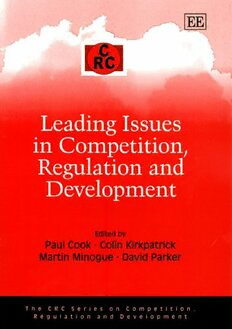
Leading Issues in Competition, Regulation And Development (Crc Series on Competition, Regulation and Development) PDF
02005·0.141 MB·English
Most books are stored in the elastic cloud where traffic is expensive. For this reason, we have a limit on daily download.
Preview Leading Issues in Competition, Regulation And Development (Crc Series on Competition, Regulation and Development)
Description:
The promotion of liberalized and deregulated markets by bilateral and multilateral aid donors, and by global institutions such as the WTO, has led to significant attention being paid to competition and regulatory reforms in developing economies. The process of reform involves the transfer and diffusion of market models derived from practice and theory in developed countries. However, in developing countries, regulation needs to do more than simply promote competitiveness and consumer interests: it also needs to ensure that the market nurtures development. By rigorously examining the numerous impacts of regulation, this book will help to fill a significant gap in the literature on economic and social development. The book, now available in paperback, draws together contributions from leading experts across a range of disciplines including economics, law, politics and governance, public management and business management. The authors begin with an extensive overview of the issues of regulation and competition in developing countries, and carefully illustrate the important themes and concepts involved. Using a variety of country and sector case studies, they move on to focus on the problems of applicability and adaptation that are experienced in the process of transferring best practice policy models from developed to developing countries. The book presents a clear agenda for further empirical research and is notable for its rigorous exploration of the links between theory and practice. Although there is substantial interest in competition and regulation, as yet there has been relatively little investigation of these issues in developing economies. This book redresses the balance and will be a valuable resource for researchers, academics, teachers and students interested in development economics and development studies. It will also be of great relevance for practitioners and policymakers working in the fields of competition policy and regulatory reform.
See more
The list of books you might like
Most books are stored in the elastic cloud where traffic is expensive. For this reason, we have a limit on daily download.
